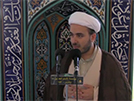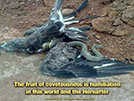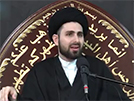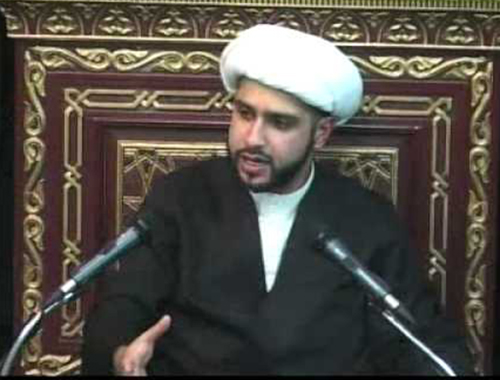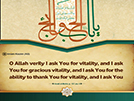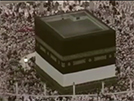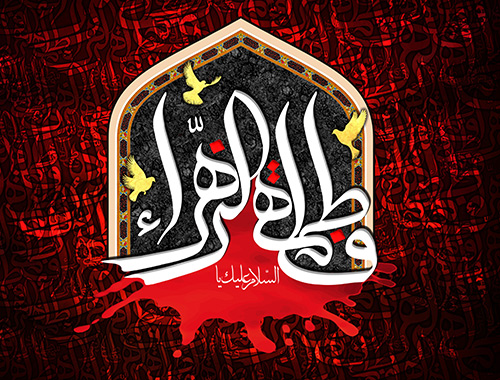Letter 90
- Details
- Hits: 3847
Letter 90
Usamah's Regiment
Rabi`l-Awwal 17, 1330
If you have truly submitted to the truth, without fearing any blame, then you are the ultimate goal and the true objective. You are above getting confused about what is right and what is not, and you are above hiding the truth. You are even more than that, more honourable, and more virtuous.
You have, may Allah raise your status of honour, asked me to narrate for you all other incidents in which they preferred to follow their own views rather than submitting to divine orders; therefore, consider the incident of the regiment of Usamah ibn Zayd ibn Harithah dispatched to invade the Romans. It was the last regiment contemporary to the Prophet (pbuh) who paid it a great concern, ordering his companions to prepare for it, earnestly urging them to do so. He raised the army in his own pure person in order to give those enlisted in it a great deal of moral encouragement and address their conscience. He did not spare any dignitary from among the Muhajirün nor the Ansar, such as Abu Bakr, `Umer,[1] Abu `Ubaydah, Sa`d, and their peers, from enlisting.[2]
It took place on Safar 26, 11 A.H. The next day, he called upon Usamah and said: "Go to the place where your father had been murdered and let your cavalry roam it, for I have vested upon you the leadership of these troops; therefore, invade Ubna[3] in the morning, burn their homes and come back faster than the tidings of your deeds. If Allah grants you the upper hand over them, do not stay there too long. Take road guides with you; dispatch others to collect information for you, and let the scouts escort you."
On Safar 38, his death fever intensified, and he started suffering from headaches. On Safar 29, he found them reluctant to leave; therefore, he went out to urge them to expedite the campaign. He (pbuh) tied the flag for Usamah with his own eminent hands in order to stir their conscience and manipulate their determination. Then he said: "Go in the Name of Allah, in the Path of Allah, and fight those who disbelieve in Allah." Usamah took the tied flag and handed it to Buraydah, then he camped at Jurf. Even there, they slackened and did not leave, in spite of all the clear statements of the Prophet (pbuh) urging them to expedite the campaign, such as: "... invade Ubna in the morning," and "... come back faster than the tidings of your deeds," in addition to many such orders which they never followed in reference to that regiment. Moreover, even some of them started questioning the wisdom of selecting Usamah for its leadership, just as they had questioned that of his father's, making several remarks to that effect, in spite of their witnessing the Prophet (pbuh) vesting upon him such a responsibility, and their hearing the Prophet (pbuh) saying to him: "I have vested upon you the leadership of these troops," and their seeing him tying the flag for him, which is the symbol of authority, with his own eminent hands, and all of that he (pbuh) did in spite of his fever.
All of the above did not stop them from casting doubts about the wisdom of selecting him as the regiment's commander, so much so that their grumbling angered the Prophet (pbuh) who went out one day, his head bandaged,[4] wrapped in a blanket, suffering the pain of fever, on a Saturday, the 10th of Rabi`ul-Awwal, only two days before his demise, and ascended the pulpit. Having seated himself on the pulpit, he (pbuh) praised Allah and glorified Him, then, according to the consensus of historians and scholars, he said:
"O people! It has come to my knowledge that some of you have felt uneasy about my appointment of Usamah [as the commander]. If you cast doubts about his appointment, you had done so before when I appointed his father who, by Allah, was worthy of such authority, and so is his son after him."
He urged them to start marching, and they in fact did start bidding him farewell and leaving to join the troops stationed at al-Jurf, while he was still urging them to rush. Then his sickness worsened, yet he kept saying: "Usamah's army! Complete the mission of Usamah's army! Dispatch Usamah's troops!" He kept repeating these orders even while they were still reluctant to respond. On the 12th of Rabi`ul-Awwal, Usamah left his temporary quarters at al-Jurf and visited the Prophet (pbuh) who ordered him to start his mission immediately, saying: "Tomorrow, by the blessing of Allah, the Exalted One, leave early in the morning," so he bade him farewell and left for the camp. Accompanied by `Umer and Abu `Ubaydah, he went back again to see the Prophet. The three men reached the Prophet who was breathing his last. He died, may my life and those of the world be sacrificed for his sake, on the same day, and the army returned to Medina and considered cancelling the campaign altogether.
They discussed this matter with Abu Bakr, pressuring him a great deal to endorse their idea of cancellation, in spite of witnessing all the emphasis the Prophet (pbuh) had placed on rushing the mission, having heard his statement stressing that they should expedite sending the troops in a way too fast to allow the enemy to know about it, spending so much effort raising the army personally, appointing Usamah to take charge of it, and tying its flag with his own hands, saying: "Tomorrow, by the blessing of Allah, the Exalted One, leave early in the morning," till he died, as you have come to know. Had it not been for the newly appointed successor of the Prophet (pbuh), they would have all decided to cancel the campaign and untie the flag's knot, but the caliph [Abu Bakr] refused to do so, and when they saw him determined to carry on the mission, `Umer approached him and requested him on behalf of the Ansar to depose Usamah from the post of the army's leader and appoint someone else.
It was not long since they had angered the Prophet and annoyed him by their displeasure with his appointment of Usamah as the commander of the regiment, nor since his going out of his house for the same reason, painfully feverish, bandaged, wrapped in a blanket, unable to walk steadily, his legs hardly carrying him due to the pain from which he was suffering; having ascended the pulpit, breathing heavily, fighting his pain, he said: "O people! It has come to my knowledge that some of you have felt uneasy about my appointment of Usamah [as the commander]. If you cast doubts about his appointment, you had done so before when I appointed his father who, by Allah, was worthy of such an authority, and so is his son after him." Thus did he, peace be upon him and his progeny, emphasize, by swearing by Allah, that they should submit to what he had decreed. They did not. The new caliph [Abu Bakr] refused to yield to their pressure to remove Usamah from his post. He leaped and took `Umer by the beard saying: "May your mother lose you, and may she be deprived of you as a son! He has been appointed by the Messenger of Allah (pbuh) and you still ask me to depose him?!"[5] They reluctantly dispatched Usamah's regiment. The total number of his troops was no more than three thousand, including one thousand cavaliers.[6] It was dodged by many of those who had been drafted by the Messenger of Allah (pbuh) himself. According to Shahristani's fourth Introduction to his book Al-Milal wal Nihal, the Prophet (pbuh) is quoted saying: "Draft in Usamah's army; may Allah curse its draft dodgers."
You may also know that initially they were reluctant to go with the regiment; then they finally dodged, just to firmly lay the foundations of their political structure and set its bases, preferring it to the carrying out of the orders of the Prophet. They saw that such a political structure was more worthy of their concern and attention, since their reluctance to draft would not cancel the dispatching of the troops, nor would the draft dodgers either. As regarding the caliphate, they would certainly miss it had they participated in the campaign before the Prophet's demise. He (pbuh) had desired that they should leave the capital in order to clear the way for the establishment of the caliphate for the Commander of the Faithful Ali ibn Abu Talib (as) peacefully and quietly. So, when they would come back, such caliphate would have already been established and settled down for Ali, and there would have been no chance for them to dispute or question it.
The Prophet (pbuh) had selected Usamah, who was seventeen years old,[7] to be their commander simply in order to subdue the stiff necks of some of them, and out of his own desire to contain the ambition of others, and also as a safeguard for protecting the peace in the future against the dispute of those who were obviously ambitious and hopeful, had he chosen one of them instead. But they were intelligent enough to be aware of what he (pbuh) was planning; so, they questioned the appointment of Usamah, reluctantly refused to accompany him, and did not leave Jurf till the soul of the Prophet (pbuh) returned to its Lord. It was then that they decided to cancel the campaign and untie the flag's knot on one hand, and to depose Usamah on the other. Moreover, many of them became draft dodgers, as you have come to know. These are five reasons why they did not act upon the Prophet's hadith, preferring their own political interests, and following their own judgment rather than implementing the spirit of his hadith, Wassalam.
Sincerely,
Sh
=====================
[1] Authors of books of tradition and history have unanimously accepted the fact that Abu Bakr and `Umer, may Allah be pleased with them, were enlisted in the same army, stating such a fact in their books unreservedly, and this is one of the instances in which they have never disputed. Refer, therefore, to any book which contains information about this particular expedition such as Ibn Sa`d's Tabaqat, the books of history by al-Tabari and Ibn al-Athir, Al-Sira al-Halabiyya, Al-Sira al-Dahlaniyya, and others, so that you may find out for yourself. When al-Halabi discusses this campaign in Vol. 3 of his Sira [biography book], he mentions an interesting anecdote which we would like to quote here as he words it:
When the caliph al-Mehdi entered Basra, he happened to see Iyas ibn Mu`awiyah, who is proverbial in sharpness of intellect, and who was then a young boy surrounded by as many as four hundred men of knowledge and prestige, al-Mehdi asked him: "What beards! Couldn't they find an older sage to follow rather than this teenager?" Then al-Mehdi turned to him and asked him how old he was. He answered: "I am, may Allah prolong the presence of the commander of the faithful among us, the same age Usamah ibn Zayd ibn Harithah was when the Messenger of Allah (pbuh) entrusted him to lead the army in which both Abu Bakr and `Umer served." Al-Mehdi said: "Come close, may Allah bless you." He was then seventeen years old.
[2] `Umer used to say to Usamah: "The Messenger of Allah (pbuh) has died leaving you in command over me." He is quoted by a group of renown scholars such as al-Halabi while discussing Usamah's army in his Al-Sira al-Halabiyya, in addition to many other traditionists and historians.
[3] It is a territory in Balqa' between `Ashkelon (a seaport in southwest Palestine) and Ramallah (in Jordan's West Bank), near Mu'ta where Zayd ibn Harithah and Ja`fer ibn Abu Talib, of the two wings in Paradise, peace be upon him, were martyred.
[4] Every traditionist and author of biography and history books who has mentioned this regiment has also mentioned their resentment of the Prophet's appointment of Usamah as the commander over them, and that he (pbuh) became extremely angry when he came to know about such resentment, hence he delivered the khutba which we have quoted earlier; so, refer to the chapter on Usamah's regiment in Ibn Sa`d's Tabaqat, both Sira books of al-Halabi and al-Dahlani, and other books dealing with this topic.
[5] This is quoted by al-Halabi and al-Dahlani in their respective Sira books, and by Ibn Jarir al-Tabari while discussing the events of the year 11 in his Tarikh, in addition to other authors of books of history.
[6] He raided Ubna, burnt their homes, cut their palm-trees, his cavalry trampled upon their residential quarters, killing a few and capturing a few others. Among those whom he killed was his father's assassin. Nobody among the Muslims was killed; so, praise be to Allah, Lord of the Worlds. Usamah was then riding his father's horse. Their banner then said: "O you who is divinely supported, take their lives," which was the Prophet's banner during the Battle of Badr. He distributed two shares of the booty to cavalry soldiers and one to the infantry, taking for himself the same.
[7] This is most likely. Some say he was eighteen years old, others say nineteen, and still others say twenty, but nobody said he was older than that.


